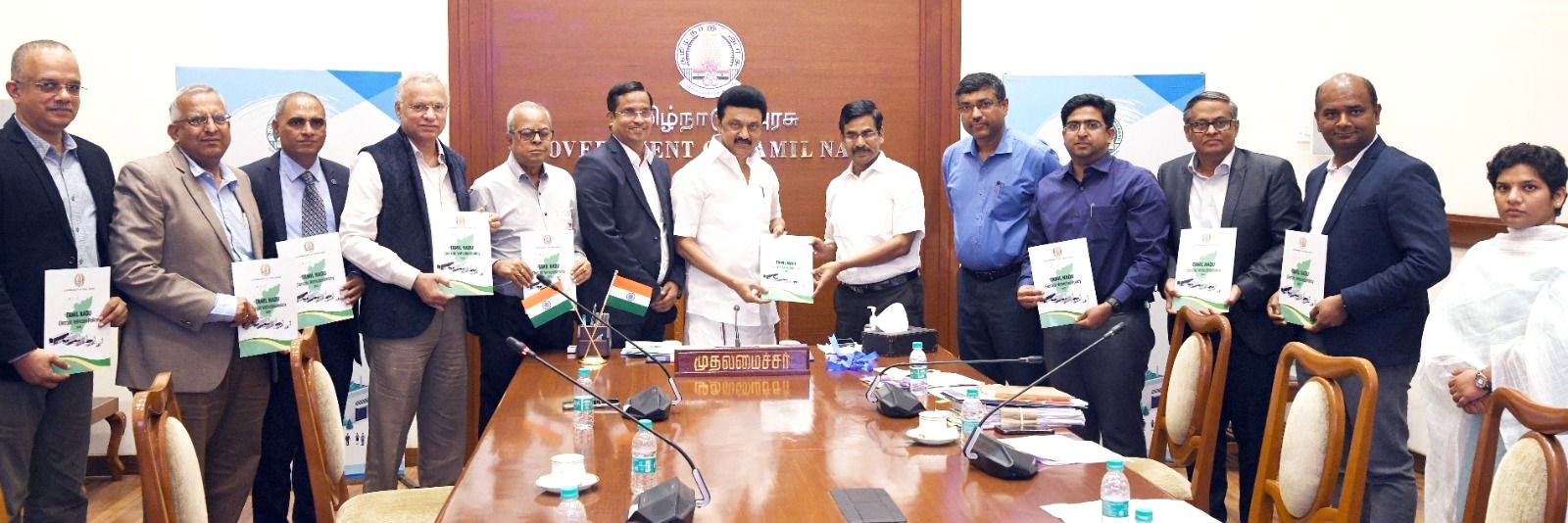Tamil Nadu EV Policy
 The southern Indian state of Tamil Nadu is set to encourage the adoption of electric vehicles (EVs) through a comprehensive set of incentives and subsidies for manufacturers, customers, and charging infrastructure providers.
The southern Indian state of Tamil Nadu is set to encourage the adoption of electric vehicles (EVs) through a comprehensive set of incentives and subsidies for manufacturers, customers, and charging infrastructure providers.
The move comes after the state saw an investment interest of around Rs 24,000 crore ($3.2 billion) in the EV sector over the past five years, with several projects offering a potential of 48,000 jobs.
New Measures and Incentives
GST Measures
The Tamil Nadu Electric Vehicles Policy 2023 includes measures such as 100% reimbursement on state goods and services tax (SGST) for EV manufacturers, investment- or turnover-based subsidies, and advanced chemistry cell subsidies.
Exemptions
The state will also exempt tax on electricity purchased from its discom for five years, exempt stamp duty, and subsidize land costs.
In addition, the state will offer a range of incentives to people using EVs, including exemptions and waivers on road tax, registration charges, and permit fees, as well as purchase incentives ranging from Rs 5,000 to Rs 10 lakh.
Incentives for Electric Bus in the TN EV policy
Tamil Nadu plans to gradually transition a significant share of its public transport fleet to EVs, with state transport utilities encouraged to electrify their fleets through loan programs from multilateral agencies.
The state aims to increase the share of electric buses in its fleet to 30% by 2030. Private buses and vehicles of schools and colleges will also be encouraged to switch to EVs.
Tamilnadu State incentives for EV Drivers
Type Vehicle Category Incentives on battery capacity Maximum Incentives Estimated number of vehicles to be incentivized
- Private e-cycles – 20% of cost up to 5,000 6,000
- Commercial E2W 10,000 kWh 30,000 6,000
- Commercial E3W 10,000 kWh 40,000 15,000
- Commercial E4W 10,000 kWh 1,50,000 3,000
- Commercial e-buses 20,000 kWh 10,00,000 300
Charging Incentives under TN EV Policy
Under FAME II, a total of 281 charging Stations have been sanctioned for Tamil Nadu, which will serve as an impetus for charging infrastructure development.
To facilitate the adoption of EVs, Tamil Nadu will develop charging infrastructure through budgetary allocations and explore the option of providing the infrastructure as a service for private operators.
The government plans to use these measures for the charging infrastructure enhancement.
Identification of sites for public slow and fast charging stations in Government offices and public places, Smart City Missions/Corporations of the EV Cities. I
dentify and prioritize the establishment of charging stations on National and State Highways at 25 km intervals on both sides.
Public charging incentives
Type Incentives
- Fast charging stations (200) Up to Rs 10,00,000
- Slow charging stations (500) Up to Rs 1,00,000
Private charging incentives
Type Incentives
- Fast charging stations (50) Up to Rs 10,00,000
The policy also includes employment incentives for EV projects, with a reimbursement of the employer’s contribution to EPF for all new jobs created during the policy period.
Companies that establish public charging stations in Tamil Nadu will be eligible for a 25% subsidy of the cost involved in the purchase of equipment and machinery during the policy period.
The first 50 private charging stations will also be eligible for this capital subsidy of 25%.
Incentives for Battery Swapping Station
The first 200 public battery swapping stations set up in Tamil Nadu shall be eligible for a capital subsidy of 25% on the cost involved in the purchase of equipment and machinery limited to Rs. 2 lakhs per station.
Type Incentives
- Battery swapping stations Up to Rs 2,00,000
Interest subvention
Under the Tamil Nadu Electric Vehicles Policy 2023, the state government will provide an interest subvention of 5% as a rebate on the rate of interest for actual term loans taken to finance electric vehicle projects. This incentive will be available for a period of 6 years, subject to certain limits.
The aim of this initiative is to incentivize the development and adoption of electric vehicles in the state of Tamil Nadu by providing financial support to companies and organizations investing in EV projects.
Investment Range (in Crores) Maximum interest subvention period Ceiling/annum (Rs.)
- 50-300 6 5 lakhs
- 300-500 6 20 lakhs
- 500-5,000 6 1 crore
- 5000+ 6 4 crores
Intellectual Property Creation Incentive
The Government of Tamil Nadu is introducing an Intellectual Property Creation Incentive to encourage companies to develop new technology in the state.
This incentive will offer 50% reimbursement on the cost incurred for patents, copyrights, and trademarks, up to a maximum of Rs. 1 crore for the period of the investment, during the policy period.
The objective of this incentive is to motivate firms to invest in the research and development of innovative electric vehicle technology by providing financial support for their intellectual property creation.
Special incentives for MSME
Capital subsidy of 20% over and above the existing capital subsidy scheme limit.
Additionally, medium-sized MSMEs that take loans from the Tamil Nadu Industrial Investment Corporation for these activities will receive a 6% interest subvention instead of thecurrent 3%.
Transition to the EV Industry
The government of TN is also giving transition benefits to ICE manufacturing companies. Automotive companies will get an up-skilling allowance of up to 10% of their current workforce on the EV production line. The transition support will be provided through a Training Subsidy of Rs. 4000 per worker per month for six months for residents of Tamil Nadu.
However, for women and transgender employees, persons with benchmarked disabilities, and persons from SC/ST communities, the training subsidy will be higher at Rs. 6000 per worker per month for six months. These measures are aimed at promoting the growth of the EV industry in the state while simultaneously encouraging social inclusivity and employment generation.
Benefits of giving Subsidies
The benefits of offering subsidies on electric vehicles are numerous. Firstly, it helps to reduce the cost of EVs, making them more affordable for consumers.
This, in turn, encourages more people to adopt EVs, which can lead to a reduction in greenhouse gas emissions, improved air quality, and decreased dependence on fossil fuels. Additionally, subsidies can incentivize the development and deployment of charging infrastructure, which is essential for the widespread adoption of EVs.
Way Forward Tamil Nadu’s Electric Vehicles Policy 2023 is a significant step towards encouraging the adoption of EVs in the state. The comprehensive set of incentives and subsidies for manufacturers, customers, and charging infrastructure providers will help to make EVs more affordable and accessible, while the measures to transition a significant share of the state’s public transport fleet to EVs and the development of charging infrastructure will facilitate their adoption
It is hoped that other states in India will follow Tamil Nadu’s example and take similar steps toward a greener, cleaner, and more sustainable future.




